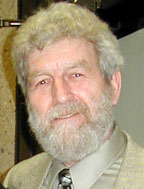 |
No coffee for Amherst students
By Chuck Armsbury, Senior Editor
 You
can't have coffee today. Sorry, it is now a banned substance
because of its dangers to human health. In a story covered by
the New York Times, Amherst (MA) college students could not buy
any of the famous brew on campus on May 8. You
can't have coffee today. Sorry, it is now a banned substance
because of its dangers to human health. In a story covered by
the New York Times, Amherst (MA) college students could not buy
any of the famous brew on campus on May 8.
Writing for the Times, Julie Flaherty said, "On any given
day the coffee house in the Amherst College campus center offers
a dozen brews, plus espresso. But today the pots were covered
with white shrouds, and the dispensers in the dining hall were
empty. This was the day that coffee was banned forever from the
campus."
Not really though. This was an elaborate class project staged
by an art student, Andrew Epstein, and pulled off with the help
of friends and the Administration.
"While not exactly the War of the Worlds," Flaherty
wrote, "students and staff members did panic when they showed
up for their morning cup and found signs that read:
In order to curb the use of caffeine
at Amherst College, the sale and distribution of coffee are no
longer permitted on campus. Effective Immediately."
Questions were to be directed to the Caffeine
Control Coordinator.
The dining services, which were in on the joke, brewed not a
drop today.
Mr. Epstein, who is 22, conceived the Day of No Joe as a final
project for his art class on social sculpture to draw attention
to what he regards as the hypocrisy of drug laws. A painting
is easily ignored, he said, but remove part of a person's daily
routine, and notice is taken.
"I came upon this idea of trying to re-create Prohibition
by taking away a substance that's been culturally domesticated,
to make people aware of their own substance abuse," Mr.
Epstein said.
Recruiting friends to act as black-market coffee dealers, they
sat outside the dining hall offering bootleg java at inflated
prices. "Hey, you need coffee?" Dan Farbman, 22, a
senior, hissed from behind his dark glasses. To entice hard-core
addicts looking for a quick hit, he added: "Espresso beans,
10 cents a bean." Some bought. Most just averted their eyes
or said, "No thanks."
Several confused students attended a news conference at which
Mr. Epstein enumerated the dangers of caffeine. "Is this
for real?" a student reportedly asked Epstein, who also
volunteers with November Coalition. That comment showed him he'd
succeeded in illustrating his message.
The true art of Andrew's work was in persuading the college to
go along with his scheme. The student government approved his
plan in a late-night, closed-door session. Epstein also met with
Charles Thompson, the director of dining services, and Tom Gerety,
president of the college, who gave their tacit blessing.
DeWitt Godfrey, the assistant professor who oversaw the art projects,
said Mr. Epstein, who is known around campus for his involvement
in Students for a Sensible Drug Policy, was wise to couch his
proposal as art, not policy.
"I suspect if he had come to the administration as an activist,
there would have been much stronger resistance," Mr. Godfrey
said in the Times. "It shows us how art has this kind of
peculiar permission."
Mr. Thompson, the head of dining services, was said to have had
trouble sleeping for several nights before May 8th, knowing that
he and his staff would be on the front lines when people discovered
that coffee was no more.
Obviously conflicted, Thompson lamented that refusing to sell
caffeine "went against everything I believe in my job."
He posted signs on the following day apologizing for the inconvenience,
and offered hazelnut and other specialty coffees in the dining
hall as penance.
"It wasn't as bad as I thought it would be," Mr. Thompson
admitted to Flaherty. Mr. Epstein had originally proposed to
stage his coffee ban next week - finals week. However, Mr. Thompson
objected, feeling that that would constitute cruel and unusual
punishment.

|

